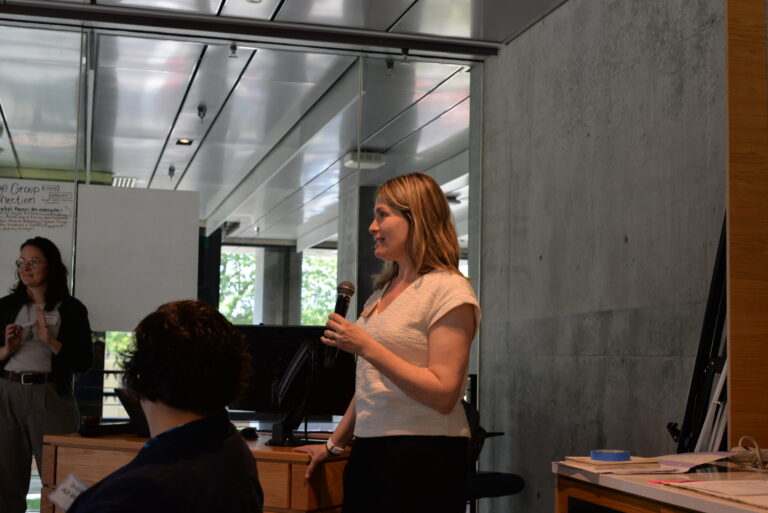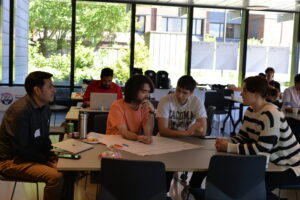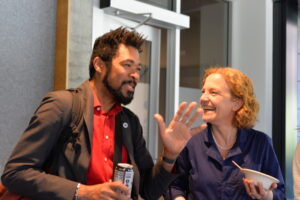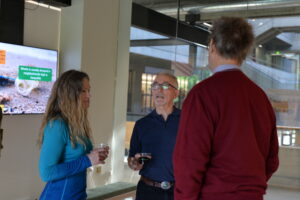Published on July 16, 2025

Urban@UW Director Rachel Berney facilitated conversations about knowledge exchange in the Research to Action Collaboratory.
On Thursday, May 22nd, scholars, students, and community leaders gathered to share their insights into Urban@W’s Research to Action Collaboratory. Four RAC teams presented:
- Just Circular Communities Collaborative : working toward just environmental transitions within a circular economy frame in a South Seattle frontline community.
- Extreme Heat: a tri-county public health initiative to prepare for extreme weather.
- Microforest: creating a microforest and micro-prairie on the UW Tacoma campus to improve the environment, build community, and celebrate Tacoma’s diverse heritage.
- Green Stormwater Recycling: quantifying the rainwater collected by an agency serving refugees and asylum seekers, and researching how they could procure tax benefits for conservation.

JC3 members Nat Eve Gregorius and Catherine De Almeida presented their group’s image of how collaboration fosters ecosystem health.
What We Learned
Together with Urban@UW leadership the RAC teams explored the benefits of the accelerator program. The following major themes emerged:
Process over Product
- RAC skill-building in facilitation and the program’s flexibility created space for process-oriented work, which fostered reflection, innovation, and adaptability.
- Incubation time allowed for teams to set goals grounded in shared understanding.
- RAC’s flexibility meant teams could adapt goals as more was discovered or circumstances changed.
Learning and Knowledge Exchange
- The RAC process supports transdisciplinary learning, generating new understanding through collaboration.
- Teams experienced different ways of doing community engagement.
- Cross pollination occurred when lived experience and academic knowledge led to deeper insights.
- Team members valued learning different “languages” by understanding a diversity of disciplines and cultures.
Community Building
- Project success relies on reciprocal relationships.
- Community input is essential.
- Healthy collaboration requires ongoing investment in team building. Trust and connection are essential to sustaining work.
The 2024-5 cohort will be wrapping up their projects soon, and we’ll share their results later in 2025!

Rubén Casas shared the design of the microforest and microprairie his team is creating on the UW Tacoma campus.
Products and Outcomes
While the 2024-25 cohort won’t complete their work until this autumn, the 2023-24 cohort had exciting products to share.
The Just Circular Communities Collaboratory team created a playbook/guidebook and worksheets for future teams, a comic telling the story of their work, and a website. The JC3 Team will continue their efforts thanks to an EarthLab grant.
The Extreme Heat Team completed formative evaluations and a logic model, hosted an in-person gathering of health workers, held webinars, and presented at conferences. The tri-county cohort they formed will continue.

Faculty, undergraduates and graduate students shared what they learned about group process and facilitation through the RAC.
The day ended with an opening reception for Urban@UW’s Gould Gallery exhibit “When Research Sparks Change: Celebrating Ten Years of Vision and Impact.”

Urban@UW External Advisory Board Member Rico Quirindongo and Green Stormwater team member Gundula Proksch enjoying the opening reception.

RAC Co-Director Jen Davison, External Advisory Board member Steve Whitney, and Affiliate Branden Born considering the next frontier in university-community partnerships.